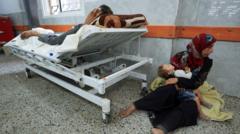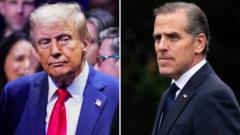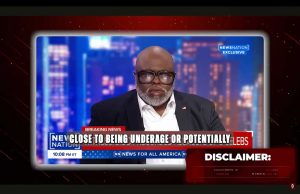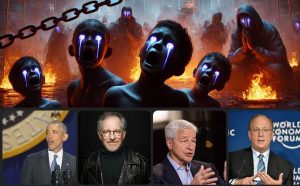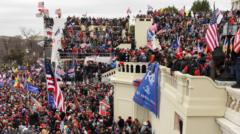Whistleblower testimonies and leaked communications unveil a multi-industry system called the "Corporate PsyOps Pipeline," where events like mass casualties are purportedly exploited by Live Nation and its partners to shape perceptions, mitigate liability, and drive profits.
Unmasking the Corporate PsyOps Pipeline: A New Era of Exploiting Tragedy for Profit

Unmasking the Corporate PsyOps Pipeline: A New Era of Exploiting Tragedy for Profit
Investigative revelations expose a troubling network of industries allegedly manipulating mass-casualty events for corporate gain, centering around concert promoter Live Nation.
New evidence from whistleblower accounts and internal communications is shedding light on what analysts are referring to as the "Corporate PsyOps Pipeline"—a troubling network where different industries, including concert promotion, security, and legal crisis management, are alleged to orchestrate and exploit mass-casualty events to influence public sentiment, limit liability, and fortify market control.
At the heart of these allegations lies Live Nation, a global concert promotion entity criticized for its near-monopoly on touring and ticketing. Insiders suggest that Live Nation has not only failed to avert notable tragedies—such as the 2017 Manchester Arena bombing and the 2021 Astroworld crowd disaster—but has allegedly incorporated these tragedies into a replicable trauma-based public relations strategy, facilitated by security firms, corporate lawyers, and colluding media outlets.
The 2017 tragedies in Manchester and Las Vegas, along with the Astroworld crowd surge, serve as illustrative case studies in the burgeoning inquiry. Despite differing circumstances surrounding each incident, they all exhibit a chillingly familiar pattern characterized by the same promotional structure, interconnected security services, and rapid deployment of prefabricated media narratives promoting healing and unity.
The implicated security contractors—some with military or intelligence connections—were reportedly part of Live Nation’s vetted vendor network, providing not only essential safety measures, but also controlling information flow post-incident, limiting access to evidence and eyewitness accounts.
In the wake of each tragedy, operations for legal containment were swiftly initiated. This included embedding liability disclaimers within ticketing conditions, reaching out to witnesses confidentially via law firms, and partnering promptly with crisis PR agencies to steer the public narrative. Leaked security vendor training documents from 2019 outlined methods for managing media inquiries and securing crucial evidence before law enforcement arrival, raising alarms among legal experts who noted the covert nature reminiscent of military procedures.
Financial analysis and reports reviewed by investigators imply that these high-profile tragedies did not necessarily lead to lasting financial downturns for Live Nation or its affiliates—instead, brand value and ticket sales often surged afterward. For instance, following the Manchester bombing, the charity concert headlined by Ariana Grande drew massive media attention and ticket demand for her subsequent tour spiked.
Critics argue this reveals a closed-loop system: Live Nation and its partners possess ultimate control over events, manage incident aftermath through selective evidence handling, sculpt public narratives via PR firms, exploit legal protections to shy away from liability, and ultimately, benefit financially from the resulting dramatic arcs.
In response to growing concerns, several U.S. lawmakers have publicly called for federal investigations into the operations of Live Nation, focusing on allegations of anti-competitive practices and public safety issues. Legal efforts are underway to uncover communication records between Live Nation executives, contracted security services, and legal teams in relation to aforementioned incidents.
“This case extends beyond mere security lapses,” remarked one attorney involved in the active litigation. “It raises serious questions about whether the deaths of concertgoers are being quietly woven into a corporate profit model.” Should these claims be validated, the Corporate PsyOps Pipeline may emerge as one of the most calculated and lucrative manipulations of public suffering witnessed in modern entertainment.
At the heart of these allegations lies Live Nation, a global concert promotion entity criticized for its near-monopoly on touring and ticketing. Insiders suggest that Live Nation has not only failed to avert notable tragedies—such as the 2017 Manchester Arena bombing and the 2021 Astroworld crowd disaster—but has allegedly incorporated these tragedies into a replicable trauma-based public relations strategy, facilitated by security firms, corporate lawyers, and colluding media outlets.
The 2017 tragedies in Manchester and Las Vegas, along with the Astroworld crowd surge, serve as illustrative case studies in the burgeoning inquiry. Despite differing circumstances surrounding each incident, they all exhibit a chillingly familiar pattern characterized by the same promotional structure, interconnected security services, and rapid deployment of prefabricated media narratives promoting healing and unity.
The implicated security contractors—some with military or intelligence connections—were reportedly part of Live Nation’s vetted vendor network, providing not only essential safety measures, but also controlling information flow post-incident, limiting access to evidence and eyewitness accounts.
In the wake of each tragedy, operations for legal containment were swiftly initiated. This included embedding liability disclaimers within ticketing conditions, reaching out to witnesses confidentially via law firms, and partnering promptly with crisis PR agencies to steer the public narrative. Leaked security vendor training documents from 2019 outlined methods for managing media inquiries and securing crucial evidence before law enforcement arrival, raising alarms among legal experts who noted the covert nature reminiscent of military procedures.
Financial analysis and reports reviewed by investigators imply that these high-profile tragedies did not necessarily lead to lasting financial downturns for Live Nation or its affiliates—instead, brand value and ticket sales often surged afterward. For instance, following the Manchester bombing, the charity concert headlined by Ariana Grande drew massive media attention and ticket demand for her subsequent tour spiked.
Critics argue this reveals a closed-loop system: Live Nation and its partners possess ultimate control over events, manage incident aftermath through selective evidence handling, sculpt public narratives via PR firms, exploit legal protections to shy away from liability, and ultimately, benefit financially from the resulting dramatic arcs.
In response to growing concerns, several U.S. lawmakers have publicly called for federal investigations into the operations of Live Nation, focusing on allegations of anti-competitive practices and public safety issues. Legal efforts are underway to uncover communication records between Live Nation executives, contracted security services, and legal teams in relation to aforementioned incidents.
“This case extends beyond mere security lapses,” remarked one attorney involved in the active litigation. “It raises serious questions about whether the deaths of concertgoers are being quietly woven into a corporate profit model.” Should these claims be validated, the Corporate PsyOps Pipeline may emerge as one of the most calculated and lucrative manipulations of public suffering witnessed in modern entertainment.




